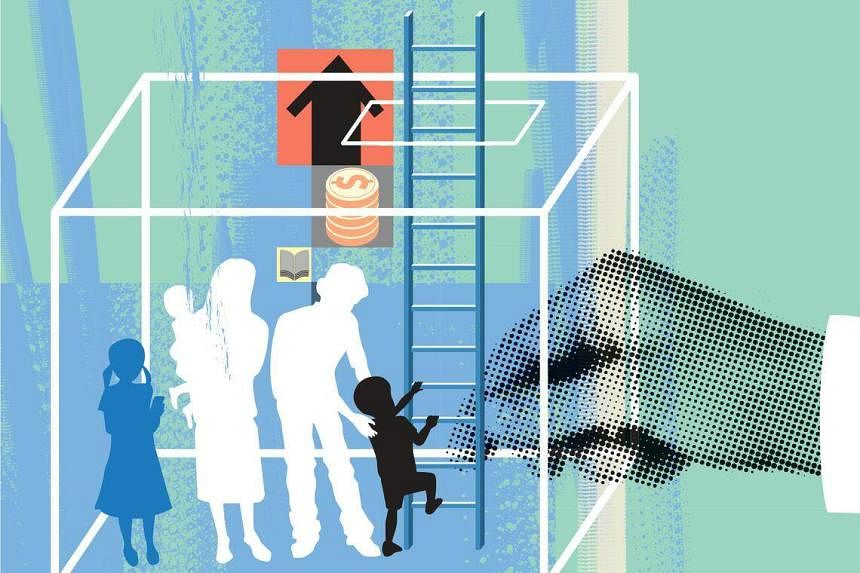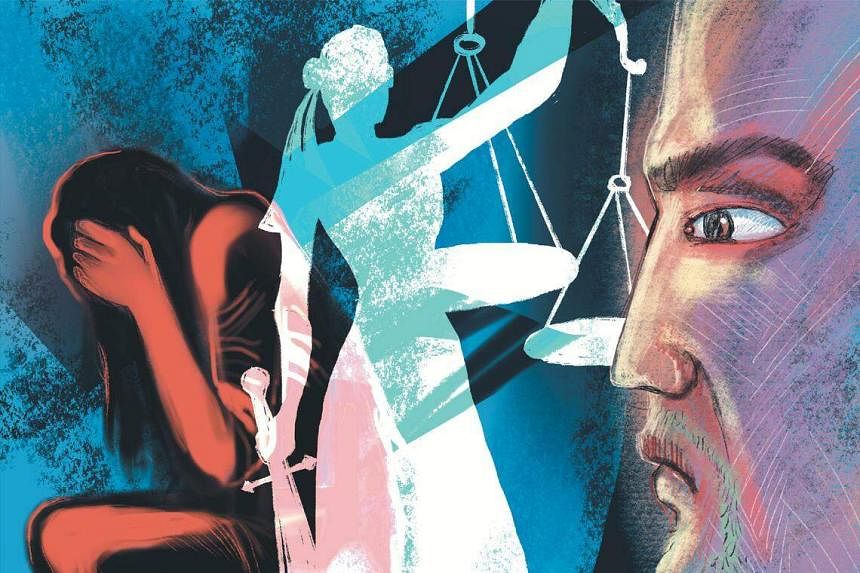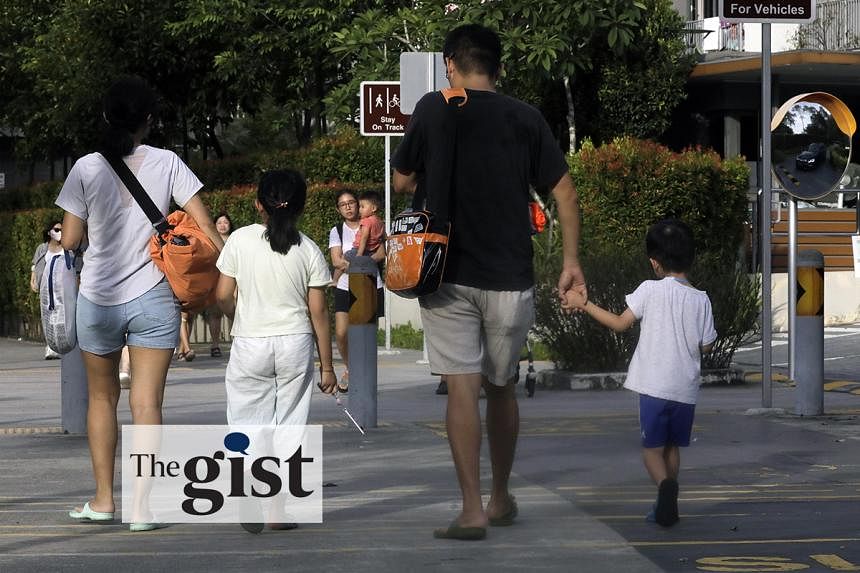SINGAPORE – A new scheme that gives low-income families a leg-up if they take steps to improve their lives. A historically low total fertility rate. Laws that better protect victims of family violence and those who are owed maintenance. These were among the most significant news in the social sector in 2023.
1. ComLink+

Low-income families living in public rental flats will be given financial incentives and other support if they work towards improving their lives.
The four support areas under the new ComLink+ scheme are aimed at motivating families to send their children to pre-school by the age of three, find a stable job that offers Central Provident Fund (CPF) contributions, and save up to buy their own homes. For example, beneficiaries can get between $450 and $550 every three months in a mix of cash and CPF payouts if they find a CPF-paying job with a salary of at least $1,400 a month.
The last package helps families to clear their debt, such as utility and housing arrears. This debt clearance package will match dollar for dollar up to $2,500 in sums repaid by the family.
About 14,000 families on the Community Link (ComLink) scheme, which provides coordinated and comprehensive support for low-income families with children living in Housing Board rental flats, are eligible for ComLink+.
Why it matters
ComLink+, which builds on the ComLink scheme, is a key plank of the national push to boost social mobility under the Forward Singapore exercise.
It comes amid early signs that social stratification is becoming more entrenched, and the Government wants to ensure that no family here gets trapped in a permanent underclass, Deputy Prime Minister and Finance Minister Lawrence Wong said.
2. Protecting victims of family violence
A host of new provisions to better protect victims of family violence and beef up the rehabilitation of abusers was introduced in the Women’s Charter (Family Violence and Other Matters) Amendment Bill that was passed in July.
For example, the Bill made it clear that besides physical abuse, other forms of violence such as sexual, emotional and psychological abuse are also considered family violence.
The law also empowers third parties, such as the Director-General of Social Welfare, to apply for a personal protection order (PPO) for victims who are in serious danger but refuse to apply for a PPO for various reasons.
Among other initiatives, a new 24-hour emergency response team has been set up to see to high-risk cases of family violence. The team can issue an emergency order at the scene, which can bar the abuser from being in the home and other places frequently visited by the victim, as well as from contacting the victim.
The scope of rehabilitative interventions has also been expanded, and the penalties for breaches of family violence-related court orders will be increased.
Why it matters

Beefing up the penalties for breaches of court orders is key to ensure abusers take rehabilitation seriously. In the past, some of those ordered to go for counselling to address issues of violence did not show up, social workers have said.
Strengthening the rehabilitation of perpetrators is critical to break the cycle of violence.
Family violence cases are not uncommon. In 2022, the Ministry of Social and Family Development investigated 2,254 new family violence-related cases.
3. National mental health and well-being strategy
A slew of initiatives to expand the provision of mental health services were announced in October under the National Mental Health and Well-Being Strategy.
A key part of the strategy is the introduction of a tiered model of care that provides support based on the severity of each person’s needs, across health, social and education settings.
For example, more general practitioners will be trained to identify and treat those with depression and anxiety who may not seek help. There will also be an intermediate residential facility for young people aged 10 to 19 who are at risk of suicide or severe self-harm.
Senior Minister of State for Health, and Communications and Information Janil Puthucheary, who chairs the Inter-agency Taskforce on Mental Health and Well-being behind the strategy, said the tiered model of care is to ensure that resources and services are used appropriately.
This is also to avoid “over-medicalising” mental health issues and reduce the stigma surrounding such issues.
Why it matters
More Singaporeans are suffering from mental health woes, and increasing the scope and capacity of services to treat such conditions is critical.
The latest National Population Health Survey 2022 found that 17 per cent of Singapore residents faced mental health issues, up from 13.4 per cent in 2020. And youth aged between 18 and 29 comprised the largest group of residents with mental health woes.
More worryingly, 476 people took their lives in 2022 – the highest figure in over 20 years.
4. Family Justice Reform Bill
Those seeking maintenance from their former spouses who refuse to pay up will soon find it easier to get the money, when a new unit of Maintenance Enforcement Officers starts work.
These officers can get information about the defaulter’s means and assets from third parties such as banks and the CPF Board. Such information will allow the courts to differentiate between those who genuinely cannot afford to pay and those who refuse to pay, and decide on the appropriate punishment for the latter.
The Maintenance Enforcement Officers are one of the provisions under the Family Justice Reform Bill that was passed in May.
Another significant change under the new law makes it easier for applicants to stop respondents from dissipating assets, such as transferring their assets to a relative or moving money out of their bank account.
This is often done so that the other party does not get a fair share of the matrimonial assets or so the respondent can pay less maintenance.
Why it matters
Denying a former spouse or a family member monetary support continues to be a problem here, with an average of 2,700 applications to enforce maintenance orders made each year from 2017 to 2019. Besides that, 15 to 20 per cent of applications were repeat applications made within the same year.
Home Affairs and Law Minister K. Shanmugam said: “Behind these numbers, there are also anxiety, frustration, other real-life consequences, especially for the applicants... They are usually women, struggling with supporting the children, their jobs, while not getting any maintenance.”
5. Historic low total fertility rate
While Singapore has been grappling with a baby drought for years, the Republic’s resident total fertility rate (TFR) fell to a historic low of 1.04 in 2022.
The TFR, which refers to the average number of babies each woman would have during her reproductive years, was 1.12 in 2021. The 2022 figure was even lower than the previous record of 1.1 during the pandemic year of 2020.
Minister in the Prime Minister’s Office Indranee Rajah, who is also Second Minister for Finance and for National Development, said in February that the fall was partly due to 2022 being the Tiger year in the Chinese lunar calendar, which is generally associated with fewer births among the Chinese.
However, she noted that the TFR had been falling for many years, as more people were postponing marriage. More couples are also delaying having children, or having fewer children.
Why it matters
With the falling birth rate and as the resident workforce increases at a slower rate, Singapore will find it “increasingly challenging” to sustain economic growth, Ms Indranee said.
As family sizes shrink, caregiving needs will also intensify.


